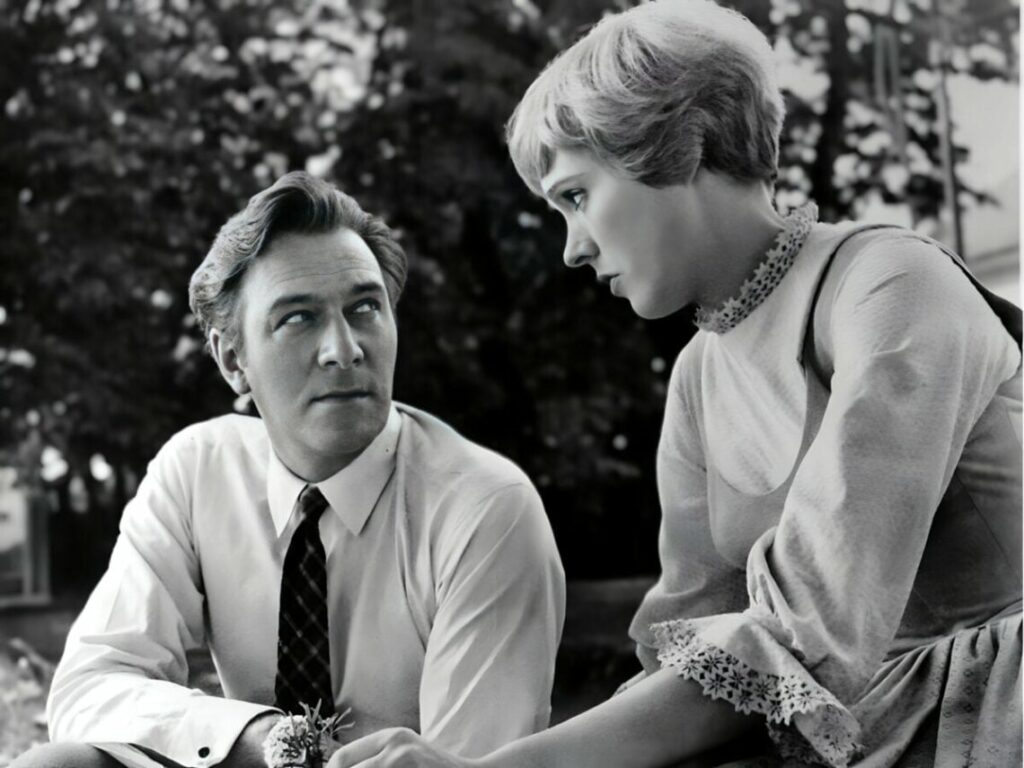The revolutionary soft masculinity of ‘Edelweiss’ in ‘The Sound of Music’
 Posted On
Posted On
(Credit: 20th Century Fox)
It’s rare for a film to stand the test of time, with many crumbling in the face of modernity due to dodgy visual effects or dialogue that taints the overall impact. However, it seems to be that some of the oldest movies remain the most powerful, with a nostalgic yet timeless feel that translates from generation to generation because of their simplicity and stripped-back nature. Whether it be the charged chemistry of Double Indemnity or the doomed romance of Casablanca, many films from the old Hollywood era continue to resonate with modern audiences and set a high bar for current projects. But while many of these stories are timeless, there are very few that were ahead of their time, besides one film that was revolutionary because of the existence of one scene.
The Sound of Music is one of the most glorious viewing experiences cinema has to offer. It features lush visuals and sweeping musical numbers beautifully paired with expressive and naturalistic performances. The film also has a surprisingly erotic core as we watch the slow-burning romance between Maria and the Captain play out through loaded gestures and lingering glances.
The film is widely loved for all of these reasons, with iconic lines and lyrics staying in the public consciousness and leading global audiences to truly ponder how to solve a problem like Maria, as well as the age-old conundrum of whether the hills are really alive with the sound of music.
But while these moments are all wonderful and continue to define the childhood of many film lovers who grew up singing these songs and nursing intense crushes on Christopher Plummer, there is one scene that never fails to move and inspire in its radical tenderness and softness.
When we first meet the Captain, he comes across as being stoic and cruel as he enforces strict rules and regulations on his children, not allowing them to properly grieve the death of their mother and instead choosing to ignore this trauma in the hopes that their collective pain will go away. Alas, this tactic does not work, and the children are notoriously difficult around each of their nannies, eventually driving them all away through a collection of pranks and mean tricks. But Maria is the one to change it all, giving them a run for their money and challenging them by nursing their curiosity and trouble-making through spontaneous adventures and outings.
Naturally, Maria is a catch, and the Captain begins to fall in love with her, letting go of his emotionless facade as he opens himself up to the possibility of a new life with her. The transformative power of love and vulnerability is all captured during one scene as the Captain performs a song called Edelweiss to his entire family on an acoustic guitar.
While most of the film is defined by the huge musical numbers with elaborate choreography and complicated camera work, the Edelweiss scene is so pure and stripped back, showing this man who has been so restricted by his pain and fear of being hurt that he had closed himself off to everyone, including his children. But during the Edelweiss scene, he finally opens himself up and sings a beautifully simple song that leaves him completely exposed. There is nothing to hide behind – no choreography, complex camerawork or mountains in the background, just a man trying to express a side of himself that has been repressed for so long, with the people most close to him watching in awe as he lays himself bare for them.
The simplicity of the scene is radical within the context of the film, showing a man who is defined by his status and authority in the army and his conformity to hyper-masculine ideals and traditions. The presence of the war only adds to this pressure, with the Captain having to maintain an unfeeling and strict facade in order to earn the respect of his colleagues and fellow soldiers, something that only further isolates him from his family by distancing himself from connection entirely.
But during the Edelweiss scene, we see an entirely new side to the Captain; he is vulnerable and displays a soft masculinity that was completely transformative at the time, showing that you can be emotionally expressive and this doesn’t detract from your strength. In fact, this open display of vulnerability only makes you stronger and strengthens your relationships, making your life more full.
In a cinematic world that is dominated by the presence of unfeeling and robotic men who are treated as killing machines and relentless warriors, the impact of seeing a man in such a typically masculine role being vulnerable is something that has redefined the portrayal of men and helped reshape the binaries of gender on screen. It has taken many years for the film industry to reflect the changing nature of gender expectations in the stories we see, but The Sound of Music was one of the first to do so, with a nuanced and compassionate portrait of a man’s evolution towards love and connection, in which the final step to breaking down his walls is to sing to his children and open his heart through the sound of music.
[embedded content]
Related Topics


